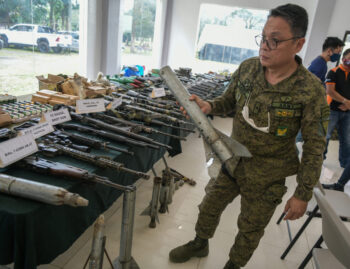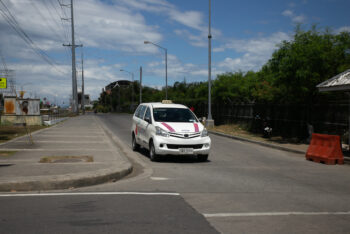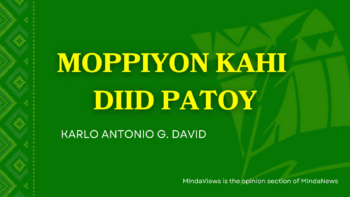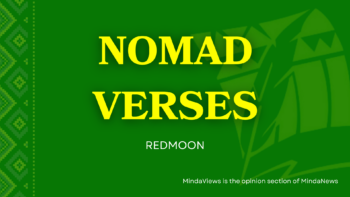DAVAO CITY (MindaNews/29 Sept) — “Since wars begin in the minds of men (and women), it is in the minds of men (and women) that the defenses of peace must be constructed.”
So states the constitution of the United Nations Education, Scientific and Culture Organization, (UNESCO) which provides the rationale for the UN’s program on Culture of Peace, which seeks to maximize the “soft power” of culture, education, and science to prevent and reduce violence and war. In particular, through research, education, and respect for “marginalized” knowledge, UNESCO is encouraging communities around the world to understand the underlying thought processes and justifications of war. This process, combined with inter-cultural and inter-religious dialogue, will lead to a broader, more thoughtful, and hopefully, a more productive dialogue as an antidote to violence.
This past September 20, I gave a short workshop on Culture of Peace, jointly sponsored by the Office of the Presidential Adviser on the Peace Process and Ateneo de Davao University, as part of the build-up to the celebration of the International Day of Peace on September 21. Promotion of a Culture of Peace, along with Conflict Sensitive Development in conflict-affected areas, are two of the major thrusts of the current administration’s peace efforts to end the Bangsamoro insurgency.
September 21, as many of us know, also commemorates the day in 1972 when martial law was declared by the late president Ferdinand Marcos, leading to one of the darkest periods of injustice in Filipino history. Thus, to connect the dual significance of the International day of Peace and the commemoration of Martial Law, I modified my presentation to suggest that a culture of genuine peace must also be a culture of authentic justice. In other words, achieving peace involves the pursuit of justice by making concrete efforts to build a “Culture of JustPeace.”
After the workshop, one of the young participants, a community member from a local church, asked if this could approach could also be used as an alternative in the War on Drugs. In fact, this has also been one of my conclusions, considering that the total number of people killed in the past two months of the War on Drugs has surpassed the total number of people killed in all insurgent and terror attacks, plus counter-insurgency and counter-terror police and military operations, over the past few years. Thus, while the government attempts to wind down several wars across the country, it has also launched a new national civil war on its own people.
Viewing the government lead peace processes side-by-side with the War on Drugs gives us an opportunity to reflect on an apparent schizophrenia, or split personality, of public policy. In this view, we are left to consider political initiatives that simultaneously encourage peace on one hand, while promoting violence, on the other. Perhaps, the solution to this bi-polarity in our collective thought process is to find a new way of thinking about the War on Drugs that will bridge our collective aspirations for peace and justice and promote a culture of JustPeace in the Philippines.
Therefore, strengthened by the rejoinder that, “it is in the minds of men (and women) that the defenses of peace must be constructed”, I will propose three alternative mental frameworks for addressing criminality and drugs, in the hope that these will allow us to begin collaborating, dreaming, and discovering together new ways and possibilities:
“It’s not a battle, it’s a journey,” so stated the advertisement for a private addiction support program that came across my desk recently. We could approach this not as a war, but as the journey to freedom. Dealing with the issue of drug abuse means we all have to get on board the ship that we will sail to islands of peace and prosperity. The community will do the legwork to mobilize resources and supplies to sustain the journey, and has the primary responsibility to pull the oars until we reach the open seas. We need specialists to help us navigate through the crowded harbor of boats that might get in they way, block us, or tie us down. Like a vinta, we must set our sails to the wind, and harness our cultural energy to propel ourselves forward. When we face storms, rocks, and wild currents, all hands are on deck to keep a look out for those things that will take us off course or wreck us. The journey to freedom is long and arduous, but if we all work together, we can reach our destination.
The non-violent liberation struggle. If some of our communities are struggling for a better life and suffering under the tyranny of oppression, let us use all the tools of active non-violence, community organizing, and radical peace activism. The Philippines has a long history of struggle for justice and freedom, and it is this collective history that provides resources needed to address the current situation. This will involved hard-headed and sophisticated analysis of the power players at hand, and the ways in which the levers of unjust power can be transformed and converted to leverage JustPeace. We must maintain our interconnections and solidarity together, maximizing the strengths and power of the poor and the marginalized, and recognizing the need to sacrifice and share our privilege and wealth in service of the greater common good. Let us turn the triangle of injustice as we seek true liberation from all forms of violence and oppression.
The construction zone. We must rebuild our community center from the ground up, starting at the foundation. First we need to make a design, to figure out what kind of drug-free community we want to build. Looking at other attempts, models and successful project will help us figure out what will work well in this particular soil and environment. Digging out the rocks, dirt and waste of prior construction requires, hard work, honesty and truth. The foundations must be carefully placed and expertly filled in with integrity and good governance, for without this, the building will collapse. Many different skills, workers, and professionals, are needed as not everyone has the capacity for the different elements of intervention – courts, police, therapist, corrections officers and more. Most importantly is the involvement of community from planning to inauguration, the building is a community center, so the accountability, resources and design should be gathered from those who will be using it.
Thus, if we can shift our thinking, as UNESCO states, we can open up new possibilities. The wisdom of scripture reinforces this, “Therefore, I urge you, brothers and sisters, in view of God’s mercy, to offer your bodies as a living sacrifice, holy and pleasing to God—this is your true and proper worship. Do not conform to the pattern of this world, but be transformed by the renewing of your mind. Then you will be able to test and approve what God’s will is—his good, pleasing and perfect will. (Romans 12:1-2)
It is our own selves and our own lives that we must offer in sacrificial service, not the lives of poor drug addicts, the police commando, and the innocent bystanders, in the pursuit of JustPeace. Our collective and concrete acts of sacrificial service in building, journeying, and struggling for a new society must be matched by a complete transformation, a renewal of the mind, and re-thinking, of the current war on drugs.
(MindaViews is the opinion section of MindaNews. Jeremy Simons has lived in the Philippines for over 21 years, the past seven, in Davao City. He works as a peacebuilding trainer, researcher, and consultant with various academic institutions, NGOs, government programs, as well as partnering with Lumad communities for conflict transformation. Prior to coming to Davao, he lived for six years in an urban poor community that was severely affected by drugs, working as a community organizer in neighborhood justice programs, engaging in community policing and transformative justice initiatives. He can be reached at justpeaceadvocate@gmail.com and blogs at https://plowingpeacesowingjustice.blogspot.com)







